

Following the success of the learning technologist, is it time for a research equivalent? With so many scholarly communications tools and technologies now available, how do academics decide which are most appropriate for their research?
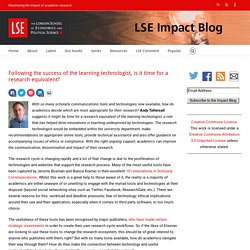
Andy Tattersall suggests it might be time for a research equivalent of the learning technologist, a role that has helped drive innovations in teaching underpinned by technologies. The research technologist would be embedded within the university department, make recommendations on appropriate online tools, provide technical assistance and also offer guidance on accompanying issues of ethics or compliance. With the right ongoing support, academics can improve the communication, dissemination and impact of their research. The research cycle is changing rapidly and a lot of that change is due to the proliferation of technologies and websites that support the research process.
Many of the most useful tools have been captured by Jerome Bosman and Bianca Kramer in their excellent 101 Innovations in Scholarly Communications. About the author. UKSG eNews. 03 Nov 2016 A Semantico white paper, 'Combining identity and access management' by Tasha Mellins-Cohen, Director of Product Development at Semantico, suggests that a seamless approach delivers the experience today’s researchers expect.
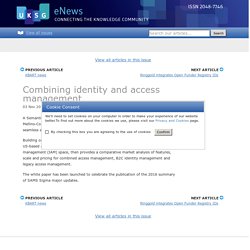
Building on research from UK public sector technology service provider Eduserv and US-based academic think tank Ithaka S&R, the paper defines the identity and access management (IAM) space, then provides a comparative market analysis of features, scale and pricing for combined access management, B2C identity management and legacy access management. The white paper has been launched to celebrate the publication of the 2016 summary of SAMS Sigma major updates. Update to policy Research Excellence Franework Nov 2016/35. Purpose 1.

This document sets out the details of a requirement that certain research outputs should be made open-access to be eligible for submission to the next Research Excellence Framework (REF). This requirement will apply to journal articles and conference proceedings accepted for publication after 1 April 2016. This document further updates and supersedes the previous ‘Policy for open access in the post-2014 Research Excellence Framework (HEFCE 2014/07), which was published in March 2014 and later updated following feedback from the sector.The only substantive change is an alteration to the timetable – see paragraph 19.
Key points 2. 3. 4. Action required 5. The impact of article processing charges on libraries and what is being done to help. Following significant growth in gold open access publishing, Katie Shamash looks at the available APC data and picks out some key insights.
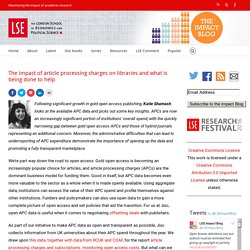
APCs are now an increasingly significant portion of institutions’ overall spend, with the quickly narrowing gap between gold open access APCs and those of hybrid journals representing an additional concern. Moreover, the administrative difficulties that can lead to underreporting of APC expenditure demonstrate the importance of opening up the data and promoting a fully transparent marketplace. We’re part way down the road to open access.
Gold open access is becoming an increasingly popular choice for articles, and article processing charges (APCs) are the dominant business model for funding them. Good in itself, but APC data becomes even more valuable to the sector as a whole when it is made openly available. Image credit: Cash Register by Steve Snodgrass. Open Access Workflows in Academic Libraries. Hello and welcome to OAWAL – Open Access Workflows for Academic Librarians.
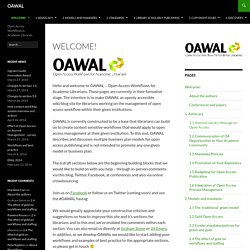
These pages are currently in their formative stage. The intention is to make OAWAL an openly accessible wiki/blog site for librarians working on the management of open access workflow within their given institutions. OAWAL is currently constructed to be a base that librarians can build on to create context sensitive workflows that would apply to open access management at their given institution. To this end, OAWAL describes and discusses multiple business plan models for open access publishing and is not intended to promote any one given model or business plan. The 6 draft sections below are the beginning building blocks that we would like to build on with you help – through in-person comments via this blog, Twitter, Facebook, at conferences and also via online crowdsourcing.
Join us on Facebook or follow us on Twitter (coming soon) and use the #OAWAL hastag.
News 2016 - ProQuest’s Pivot® Automatic Citation Ingest from ORCID Makes Its Funding Recommendation Engine More Powerful. ANN ARBOR, MI, April 15, 2016 – ProQuest is enabling automated updates from ORCID to scholar profiles in its popular Pivot® research solution.
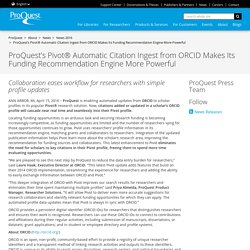
Now, citations added or updated in a scholar’s ORCID profile will cascade near real time and seamlessly into their Pivot profile. Locating funding opportunities is an arduous task and securing research funding is becoming increasingly competitive, as funding opportunities are limited and the number of researchers vying for those opportunities continues to grow. Pivot uses researchers’ profile information in its recommendation engine, matching grants and collaborators to researchers. Integration of the updated publication information helps Pivot learn more about the scholar’s research area, improving the recommendation for funding sources and collaborators.
Academic articles for free at participating local libraries. Google Scholar Citations Help. Google Scholar Citations provide a simple way for authors to keep track of citations to their articles.
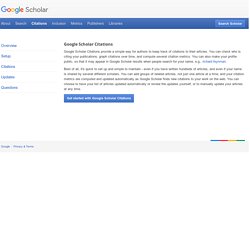
You can check who is citing your publications, graph citations over time, and compute several citation metrics. You can also make your profile public, so that it may appear in Google Scholar results when people search for your name, e.g., richard feynman. Connecting Research and Researchers. Planning Data - University of Huddersfield. Why you should make a data management plan Both the University and most funding bodies encourage or require that researchers document how they will manage any data that they create.
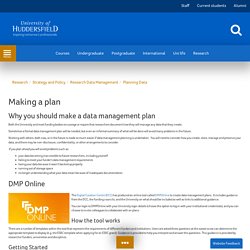
Sometimes a formal data management plan will be needed, but even an informal summary of what will be done will avoid many problems in the future. Working with others, both now, or in the future is made so much easier if data management planning is undertaken. You will need to consider how you create, store, manage and preserve your data, and there may be non-disclosure, confidentiality, or other arrangements to consider. DMPonline. Funding bodies increasingly require their grant-holders to produce Data Management Plans(DMP), both during the bid-preparation stage and after funding has been secured.
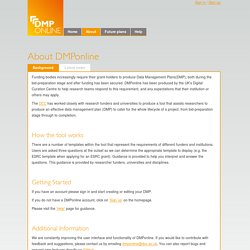
DMPonline has been produced by the UK's Digital Curation Centre to help research teams respond to this requirement, and any expectations that their institution or others may apply. The DCC has worked closely with research funders and universities to produce a tool that assists researchers to produce an effective data management plan (DMP) to cater for the whole lifecycle of a project, from bid-preparation stage through to completion. How the tool works There are a number of templates within the tool that represent the requirements of different funders and institutions.
Users are asked three questions at the outset so we can determine the appropriate template to display (e.g. the ESRC template when applying for an ESRC grant). Getting Started If you have an account please sign in and start creating or editing your DMP. Kudos – helping increase the reach and impact of research. Home : REF 2014. Value for Money in Research Support: Perplexing problems, practical solutions (with images, tweets) · AlisonMcNab. JIBS Demystifying Research Data: UWE MRD project by Liz Holliday on Prezi.
UK research data discovery. Impact challenge ebook links. UK Data Archive - CREATE & MANAGE DATA. 4 of 10: We hold the only copy of many of the UK's large national surveys charting social research back decades 5 of 10: We are an established national archive at the forefront of managing, preserving, sharing and delivering data 6 of 10: We are certified to ISO 27001, the information security standard, and helped develop the Data Seal of Approval.
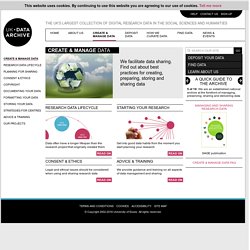
Funders' data policies. Skip to Navigation Contact us Home > Resources > Policy And Legal > Funders Data Policies Funders' data policies Summaries of UK research funders' data policies are available through the menu on the left. The summaries provide links to the funder's full policy, note core stipulations and available support e.g. guidance and data centres. UK Data Archive - RESEARCH DATA LIFECYCLE. RCUK Common Principles on Data Policy - Research Councils UK. Research Data Management - University of Leeds. Research data shared service. We’re working on a pilot service to allow researchers and institutions to meet their policy requirements for the deposit and curation of research data.
What we’re doing The pilot service will enable researchers to easily deposit data for publication, discovery, safe storage, long term archiving and preservation. Because good research needs good data. Manage your research information. The issue There’s an increasing obligation on universities to collect, analyse and report their research information. The Higher Education Statistics Agency (HESA), Research Excellence Framework (REF) and funders require detailed information about research outputs and outcomes. Universities also use information to inform and shape their strategies and showcase research. To meet these demands, they must increase the efficiency of their research information management systems, and ensure interoperability with key external stakeholders. What you can do.